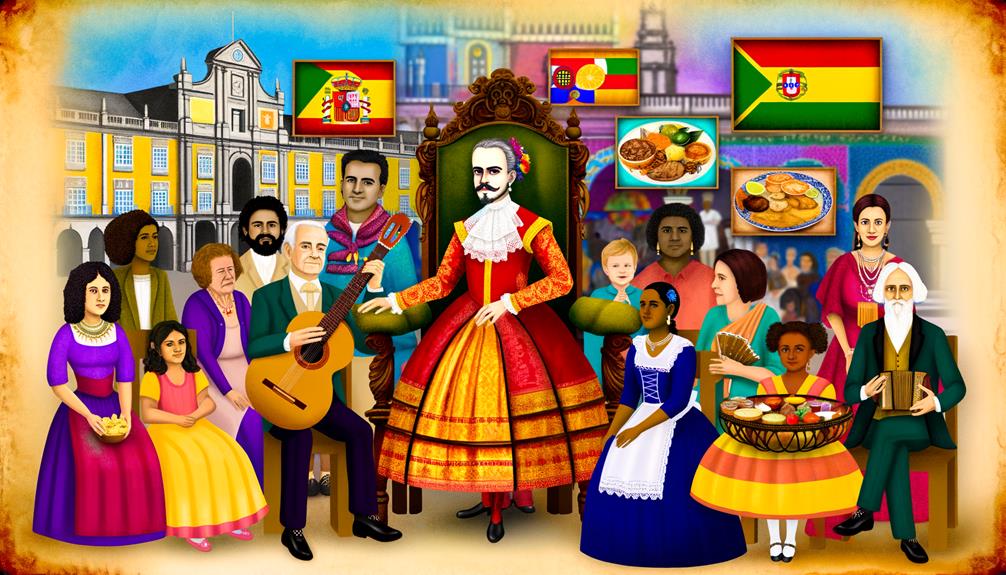Ricardo Name Meaning and Origin
Ricardo is a name of Germanic origin, derived from the Old High German elements 'ric,' meaning 'ruler' or 'power,' and 'hard,' meaning 'brave' or 'hardy.' It translates to 'powerful ruler' or 'brave leader.' The name gained prominence among Frankish nobility in the medieval period and was adopted into various European languages, evolving into the Spanish and Portuguese 'Ricardo.' Esteemed for embodying traits of leadership and valor, Ricardo remains popular particularly in Hispanic and Lusophone cultures. Beyond the historical context and etymological roots, its use in literature and media continues to underscore its timeless appeal.
Discover more intricate facets of this distinguished name.

Key Takeaways
- Ricardo originates from Old High German elements 'ric' (ruler) and 'hard' (brave).
- The name means 'powerful ruler' or 'brave leader.'
- It was introduced to England by the Normans in 1066.
- Ricardo is popular in Spanish and Portuguese-speaking cultures.
- The name symbolizes leadership and valor, reflecting its historical significance.
Historical Background
The name Ricardo, of Germanic origin, has a rich historical background that traces back to the early medieval period, specifically stemming from the Old High German elements 'ric' (meaning 'ruler' or 'power') and 'hard' (meaning 'brave' or 'hardy'). The name Ricardo became popular in Spain and Portugal during the Middle Ages, likely brought over by the Visigoths. It later spread to Latin America and other Spanish-speaking regions due to colonization and immigration. The origins of the name Andres, on the other hand, can be traced back to ancient Greece and is of Greek origin.
This name was prevalent among the Frankish nobility, reflecting the militaristic and hierarchical nature of early medieval European society.
The name's adoption by various European cultures, including the Spanish and Portuguese, signifies its integration through historical conquests and cultural exchanges.
The Normans carried the name to England after the conquest of 1066, further disseminating its usage.
The name Ricardo embodies a legacy of leadership and resilience, resonating through centuries of European history.
Etymology of Ricardo
Delving into the etymology of Ricardo reveals its roots in the Old High German components 'ric,' signifying 'ruler' or 'power,' and 'hard,' meaning 'brave' or 'hardy.' This composite name, hence, translates to 'powerful ruler' or 'brave leader.'
The name evolved through the Old French 'Richard' before being adapted into the Spanish and Portuguese 'Ricardo.' The Germanic origins highlight the cultural emphasis on leadership and valor, traits highly regarded in medieval European societies.
Linguistically, the transformation of the name across languages underscores the fluidity and adaptability of names as they traverse different cultures and epochs. Ricardo, thus, embodies a rich tapestry of historical and linguistic development, reflecting both strength and governance.
Cultural Significance
Cultural significance of the name Ricardo can be observed through its persistent popularity and esteemed connotations in various Spanish and Portuguese-speaking societies.
Historically, the name Ricardo has been associated with nobility and leadership, deriving from the Old High German elements 'ric' (ruler, leader) and 'hard' (brave, hardy). This rich etymological background has imbued the name with a sense of strength and authority, making it a favored choice among parents.
In literature and media, the name Ricardo has been frequently used to depict characters of valor and intelligence, further reinforcing its positive connotations.
Through centuries, the name has retained its resonance, symbolizing cultural heritage, continuity, and the enduring qualities of resilience and leadership in Hispanic and Lusophone cultures.
Popularity Over Time
Recognizing its cultural significance, the name Ricardo has demonstrated notable fluctuations in popularity over time, reflecting broader social, historical, and linguistic trends within Spanish and Portuguese-speaking communities.
Historically, the name originated from the Old Germanic 'Ricohard,' meaning 'powerful leader,' which spread through Iberian regions during medieval times. Its prevalence surged in periods of nationalistic revival, particularly during the 19th and early 20th centuries, influenced by literary and political figures bearing the name.
In more recent decades, the name's popularity has seen variances due to global migration patterns and the influence of media. The adaptability of the name Ricardo across different cultures and its phonetic appeal have contributed to its enduring, albeit fluctuating, presence in naming conventions.
Famous People Named Ricardo
Throughout history, numerous notable individuals named Ricardo have made significant contributions to various fields, reflecting the name's widespread cultural impact and enduring legacy.
Ricardo Arjona, a renowned Guatemalan singer-songwriter, has left an indelible mark on Latin American music with his poetic lyrics and innovative compositions.
Economist David Ricardo, often considered one of the most influential classical economists, profoundly shaped economic theory with his principles of comparative advantage and rent.
Additionally, Ricardo Montalbán, a distinguished Mexican actor, gained international acclaim for his versatile roles in film and television.
Each of these figures exemplifies the diverse talents and significant achievements associated with the name Ricardo, underscoring its historical and cultural resonance across different domains.
Variations and Nicknames
The name Ricardo, with its rich linguistic heritage, has evolved into various forms and nicknames across different cultures and languages, reflecting its adaptability and widespread appeal. Derived from the Old Germanic name 'Richard,' meaning 'powerful ruler,' Ricardo has several remarkable variations and diminutives. These adaptations showcase the name's versatility and enduring global presence.
- Rick: A common, informal abbreviation, often used in English-speaking countries.
- Ricky: A diminutive form that conveys familiarity and affection.
- Ricardinho: A Portuguese affectionate diminutive, typically used in Brazil.
- Rico: A popular Spanish and Italian short form, emphasizing the name's noble connotations.
Each variation underscores the cultural nuances and historical evolution that Ricardo has undergone, enriching its legacy.
Conclusion
The name Ricardo, rich in historical and cultural significance, traces its roots to the Old High German name Richart, meaning 'powerful leader.'
Over time, it has permeated various cultures, gaining popularity especially in Spanish and Portuguese-speaking regions.
An interesting statistic reveals that Ricardo ranked within the top 100 names for boys in Spain consistently throughout the 20th century.
This highlights its enduring appeal and the profound impact of cultural and linguistic evolution on naming conventions.






